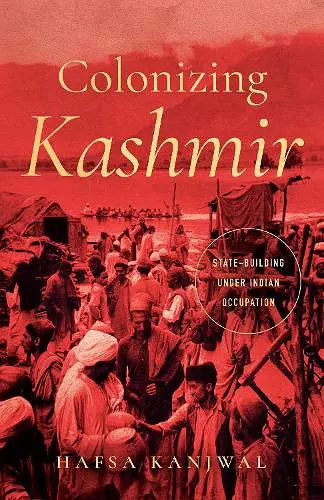Colonizing Kashmir
State-building Under Indian Occupation
Format:Paperback
Publisher:Stanford University Press
Published:25th Jul '23
Currently unavailable, and unfortunately no date known when it will be back
This paperback is available in another edition too:
- Hardback£79.00(9781503635388)

The Indian government, touted as the world's largest democracy, often repeats that Jammu and Kashmir—its only Muslim-majority state—is "an integral part of India." The region, which is disputed between India and Pakistan, and is considered the world's most militarized zone, has been occupied by India for over seventy-five years. In this book, Hafsa Kanjwal interrogates how Kashmir was made "integral" to India through a study of the decade long rule (1953-1963) of Bakshi Ghulam Mohammad, the second Prime Minister of the State of Jammu and Kashmir. Drawing upon a wide array of bureaucratic documents, propaganda materials, memoirs, literary sources, and oral interviews in English, Urdu, and Kashmiri, Kanjwal examines the intentions, tensions, and unintended consequences of Bakshi's state-building policies in the context of India's colonial occupation. She reveals how the Kashmir government tailored its policies to integrate Kashmir's Muslims while also showing how these policies were marked by inter-religious tension, corruption, and political repression.
Challenging the binaries of colonial and postcolonial, Kanjwal historicizes India's occupation of Kashmir through processes of emotional integration, development, normalization, and empowerment to highlight the new hierarchies of power and domination that emerged in the aftermath of decolonization. In doing so, she urges us to question triumphalist narratives of India's state-formation, as well as the sovereignty claims of the modern nation-state.
"Colonizing Kashmir offers a brilliant rethinking of how sovereignty and secularism work to obscure the colonizing projects of postcolonial states. For India, Kanjwal argues, the colonial occupation of Kashmir is not an aberration nor a residual of the past, rather pivotal to the formation of the newly independent state. Scholars of religion, settler colonialism, secularism, and anyone interested in the varied and unexpected modalities through which territorial control functions will gain tremendously from the sharp conceptual interventions in this meticulously researched book."—Jasbir K Puar, Rutgers University "Hafsa Kanjwal brilliantly illuminates how India consolidated its occupational control over Kashmir through state-level practices across multiple institutional domains – development, tourism, film production, economic policies, culture, and law. Through archival and interpretative analysis of a rich variety of previously unexamined primary source historical materials, Kanjwal demonstrates how India cemented Kashmir's accession over time and, in effect, domesticated the international dispute. Her fine-grained analysis of processes of integration, normalization, and bureaucratization reveals how state-building operates as a mechanism for building, entrenching, and sustaining an architecture of colonial occupation in a 'space of political liminality' such as Kashmir."—Haley Duschinski, Ohio University "Colonizing Kashmir is essential reading for anyone seeking a deeper understanding of the region. Its diligent analysis and exhaustive documentation deftly incorporates the perspectives of Kashmir's political consciousness and memory. In doing so, the book challenges and disrupts existing historiographical frameworks pertaining to Kashmir and its politics. The work holds considerable resonance with the present and future trajectory of Kashmir."—Haris Zargar, Middle East Eye "Historically invasive, theoretically cutting edge, and written in prose at once mellifluous and purposeful, this book is nothing short of a wonderfully mesmerizing intellectual earthquake in the fields of South Asian history and contemporary politics more broadly."—New Books Network "Colonizing Kashmir enables us to understand the repetitious discourse of development and normalcy through a historicization that allows for understanding the present forms of India's colonization of Kashmir as settler-colonial."—Goldie Osuri, The Contrapuntal "Kashmir's people have had a troubled history since 1947. Kanjwal presents a scholarly, impassioned historical analysis of the Indian-occupied Kashmir Valley during the crucial, decade-long regime of Bakshi Ghulam Mohammad.... Recommended."—M. H. Fisher, CHOICE "The book offers fresh and insightful perspectives on the modalities of governance and state-building employed during Bakshi's tenure, and how that came to shape its relationship with New Delhi."—Mohamad Asif Majar & Muneeb Yousuf, The Commonwealth Journal of International Affairs "Colonizing Kashmir is a significant addition to the body of work on Kashmir's history and the ongoing political dispute involving the region. It raises crucial questions about the narratives surrounding Kashmir and provides a fresh perspective on the complexities of its modern history."—Iftikhar Gilani, Kashmir Times "By retheorizing India's decolonization, Kanjwal raises necessary and important question for scholars and teachers of decolonization more broadly. How do we examine self-determination and decolonization when decolonization engendered new forms of colonialism? How were state-building projects of newly emergent nations caught up in forms of colonialism including settler occupation?"—Rajbir Singh Judge, The History Teacher "Colonizing Kashmir is an illuminating and essential read for anyone interested in developing a nuanced understanding of Kashmir's relationship with India. Given the nature of the book's core thesis, it is poised to stimulate lively debates in critical South Asian studies in the years to come."—Danish Khan, Dawn "Kanjwal's book breaks through the dark and enveloping silence thathas taken hold of the Valley since the abrogation of Article 370 in August 2019.... An important and timely work in the face of state excesses, this book isa bold attempt to academically engage with the question of Kashmir."—Ambreen Agha, Contemporary South Asia "[Colonizing Kashmir] combines rich empirical detail, carefully reasoned causal analysis, and sophisticated analytical theorization to provide an important, and very necessary, academic intervention in the existing area-studies literature on Kashmir and the theoretical literature on state-building in postcolonial societies."—Jugdep Singh Chima, Pacific Affairs "Kanjwal troubles hallowed theorizations of colonialism, settler colonialism, and occupation in postcolonial nation-states and forces more sophisticated analysis of state- and nation-building, resistance and acquiescence."—Duncan McDui-Ra, Singapore Journal of Tropical Geography
ISBN: 9781503636033
Dimensions: unknown
Weight: unknown
384 pages
New edition